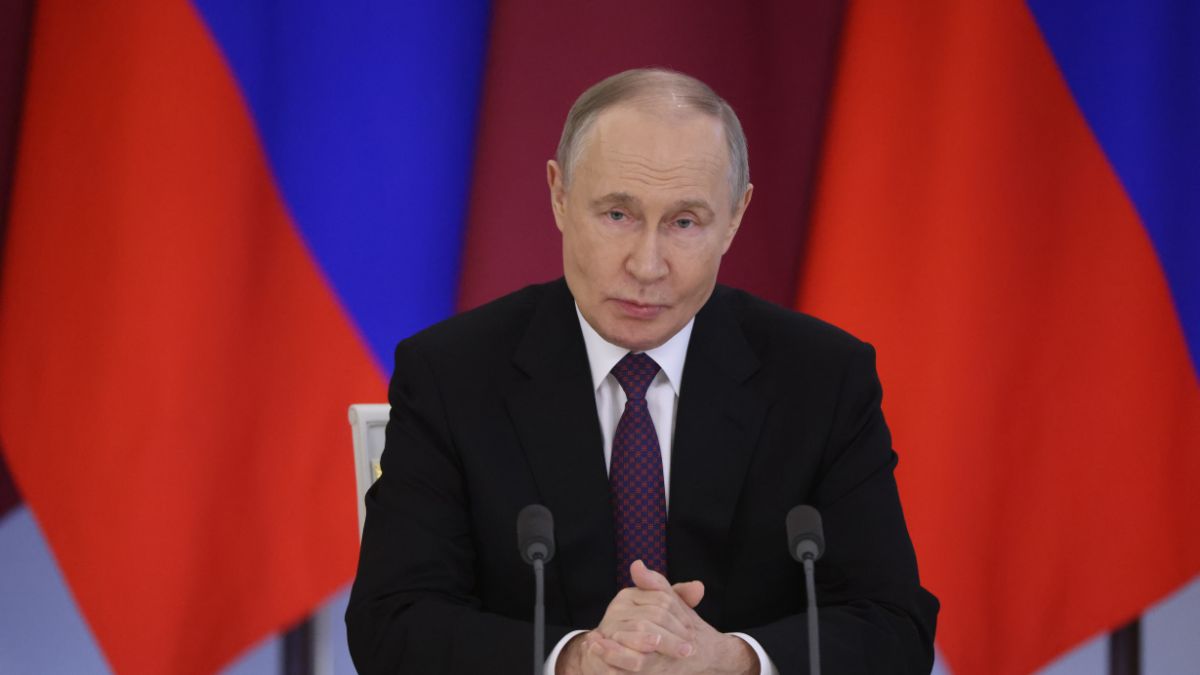
Photo by Contributor/Getty Images
Europe is finally stepping in.
German Chancellor Friedrich Merz is leading an unusual and intense diplomatic effort by organizing a series of important virtual meetings. This is a final attempt to unite Europe’s position and shape the outcome of the upcoming summit between U.S. President Donald Trump and Russian President Vladimir Putin, according to Politico. This carefully planned series of calls, arranged by Merz, will happen just before the crucial talks in Alaska about the ongoing war in Ukraine.
The goal of these meetings is to create a clear, unified strategy and make sure that the interests of Europe and Ukraine are not ignored. The virtual summit will include a strong group of international leaders, such as the heads of Germany, Finland, France, the U.K., Italy, and Poland, as well as the presidents of the European Commission and European Council, NATO leader Mark Rutte, and Ukrainian President Volodymyr Zelenskyy.
In a separate and highly expected session, President Trump and his Vice President J.D. Vance will join the discussion with the European leaders and Zelenskyy. The main topics for these talks will include different ways to increase pressure on Russia, the complicated issue of Ukrainian territories that have been taken over, the need for strong security guarantees for Kyiv, and the careful order in which any possible peace talks should happen.
Europe is stepping into peace talks with Ukraine and Russia
The active approach taken by Merz and other European leaders comes from their strong belief that a ceasefire must happen before any peace talks or land exchanges between Moscow and Kyiv. They are very worried that decisions about territory might be made by the United States and Russia alone, without input from the European countries and Ukrainian people who are most affected by the war. These leaders agree that any potential land exchanges must be fair and must have the clear approval of Kyiv. They also insist that Ukraine must receive solid security promises to protect it from future attacks.
Merz said, “we cannot accept that territorial issues between Russia and America are discussed or even decided over the heads of the Europeans, over the heads of the Ukrainians. Putin only acts under pressure.”
This coordinated effort follows a recent phone call between Merz and Trump, in which the German Chancellor repeated his view that Putin only reacts to direct pressure. During their conversation on Sunday night, Merz had urged the American president multiple times to increase pressure on Russia by enforcing severe sanctions on Russia’s banking system and applying secondary sanctions on Moscow’s trade partners. The urgency is clear, as Merz has publicly said he cannot accept a situation where the futures of European nations are decided without their direct involvement.
The carefully planned schedule for Wednesday’s virtual summit shows how serious the situation is. The day will start with a one-hour discussion among key European leaders, President Zelenskyy, and the head of NATO. After that, the most important session will take place, lasting an hour, where President Trump and Vice President Vance will join the same group of European and Ukrainian leaders.
The day will end with a joint call hosted by Germany, the U.K., and France, bringing together the coalition of countries that support Ukraine militarily. This packed diplomatic schedule reflects the desire to show a united front and to make sure the U.S. administration, now seven months into its term, fully understands Europe’s position and its non-negotiable demands before the meeting with Putin.
Merz’s main argument, that a leader like Putin will only change his actions when faced with strong and steady pressure, seems to be the reason behind all these meetings. This is Merz’s way of trying to ensure that Trump is fully informed before the summit. This is Merz’s attempt to convince Trump to shift his approach from diplomacy to pressure.



Published: Aug 11, 2025 04:03 pm